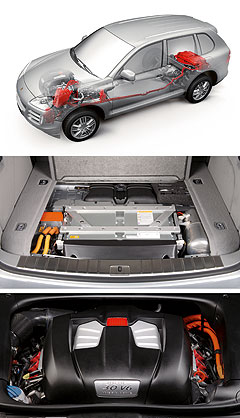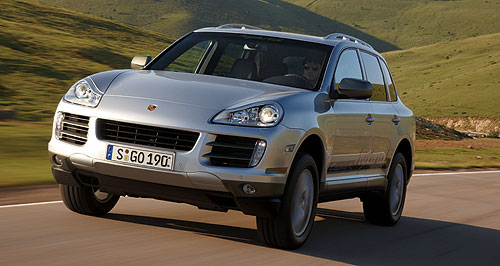Future models - Porsche - Cayenne - HybridNew Porsche Cayenne Hybrid here in a yearTest case: Porsche has been testing this Cayenne hybrid prototype in readiness for release with the new model next year. Hybrid expected to be one of the top-selling versions of Porsche’s new 2010 Cayenne12 Nov 2009 PORSCHE’S first hybrid model is expected to comprise up to a quarter of all Cayenne SUV sales when it goes on sale in Australia next year. The German sportscar maker has committed to releasing its first hybrid drivetrain in the Cayenne in 2010, and it won't be fitted to the current-generation of Porsche's first SUV, which is now seven years old. Though the company remains mum on the precise launch timing of its redesigned SUV next year, the rollout of the all-new model is expected to mirror the original Cayenne's in 2002. First official images were revealed at the Geneva motor show in March of that year, followed by its global public debut at Paris in September and then Australian sales eight months later in June 2003. Confirmation the petrol-electric SUV will be available in Australia by the end of next year all but guarantees that conventional versions of the second-generation Cayenne will also arrive more quickly from Europe than last time. "You will see the cars on sale here next year - the hybrid in any case," said Porsche Cars Australia chief Michael Winkler. Whether or not the additional Cayenne S Hybrid variant precedes or follows the release of conventional Cayenne models is unknown, but petrol and diesel V6 and naturally aspirated and turbocharged petrol V8 versions of the new Cayenne are certain, while high-performance GTS and Turbo S grades should again top the range.  Mr Winkler said the Cayenne S Hybrid variant would be priced and positioned in line with the conventional petrol V8-powered Cayenne S, which it is likely to eclipse in terms of fuel economy, if not performance. Mr Winkler said the Cayenne S Hybrid variant would be priced and positioned in line with the conventional petrol V8-powered Cayenne S, which it is likely to eclipse in terms of fuel economy, if not performance.The hybrid Cayenne is therefore expected to steal most sales from the S – which at $144,500 is the top-selling variant in Porsche’s luxury SUV range – but the jury remains out on the level of sales cannibalisation. “We believe it (the Cayenne S Hybrid) will be between 15 and 20 per cent – and maybe as much as 25 per cent - of total Cayenne sales, but 15 per cent is probably the realistic figure,” said Mr Winkler. “But whether that is on-top business or substitutional (for other Cayenne variants) is anybody’s guess. “I’d say it will be more substitutional for the V8, because if you ignore price for a moment, if you look at the performance, the hybrid will have the performance attributes of the V8 with the fuel consumption of a V6 or less. “I think there is a market for customers who wish to have both. That’s where the attractiveness in that package is.” GoAuto drove a Cayenne Hybrid prototype in July 2007, in the form of a Volkswagen-sourced 206kW 3.6-litre petrol V6 mated to a 34kW electric motor in the current Cayenne. As Porsche revealed in March, however, that petrol-electric drive system will be replaced in the 2010 production model by Audi’s newer supercharged 3.0-litre petrol V6, combined with a 38kW three-phase synchronous motor that also acts as an alternator. On its own, the misleadingly titled 3.0 TFSI V6 produces 245kW and 440Nm of torque in Audi’s S4 (213kW/420Nm in the facelifted A6 3.0 TFSI quattro), which when combined with the electric motor results in a torque output of 285Nm from standstill and 300Nm from 1140rpm. Also set to be fitted to next year’s all-new Touareg V6 TSI Hybrid from sister company Volkswagen, the system will be mated to an all-new eight-speed automatic transmission and a nickel metal hydride (NiMH) battery pack mounted inside the spare wheel well to retain the standard Cayenne’s luggage capacity. As with the hybrid Touareg, that will give the hybrid Cayenne a temporary maximum power output of 275kW and no less than 550Nm of torque – enough to deliver a claimed 0-100km/h acceleration time of just 6.8 seconds, which is in the same ballpark as the 4.8-litre Cayenne V8 that also carries the ‘S’ model designation. Along with V8 performance, the Cayenne S Hybrid’s full parallel drivetrain can return average fuel consumption of less than 9.0L/100km on the European combined cycle, equating to CO2 emissions of less than 210gm/km – 20 per cent less than a comparable conventional vehicle with similar performance. Porsche says the Cayenne Hybrid can also be driven in silent, all-electric mode at speeds of up to 50km/h or more and is capable of petrol-free steady-throttle driving at up to 138km/h in the Cayenne. While Porsche has ruled out a hybrid version of its 911 performance flagship in the near future, the Cayenne’s hybrid drivetrain will be fitted to the Panamera sedan in 2011. Mr Winkler said EV technology will play an important but not exclusive role in the future of the now Volkswagen-owned performance-car brand. “From our point of view, electric is going to play a major role in the future,” he said. "Will it be the only way going forward? No. "In the whole industry there is this great debate: what is the way forward? Is it hybrid? Is it alternative powerplants? Is it full electric?"Everything has its pros and cons. The fact of life is none of those things are the all-encompassing answer, particularly when it comes to electric cars. "You wouldn’t be able to produce enough batteries to replace every conventional car in the world with a hybrid car for a start. "Apart from that we haven’t addressed the entire environmental chain issue, from producing a car to getting rid of it, because fuel consumption is a big part in the middle but it’s only a part of the chain. None of those things have been adequately addressed."Mr Winkler said the development of Porsche’s hybrid system has resulted in a number of spin-off technologies for its conventional petrol models. “Hybrid, from the point of view of gaining electric technology experience, is also very important. “Developing a hybrid system also gives you technology you can apply to normal petrol cars. “Stop-start technology for one is a technology that came about as a direct fallout from hybrid development. “(Energy) regenerating systems are another direct result of hybrid development, so there’s a whole bunch of technologies that can be applied to normal petrol cars to increase their efficiency as a result of hybrid development without going to full hybrid. “Our hybrid development has given us access to a whole range of technologies that we can pick and choose from in future.”  Read more26th of February 2009  First details: Porsche’s Cayenne S Hybrid2010 Porsche Cayenne to get VW Touareg’s supercharged hybridAll future models Alfa Romeo Alfa Romeo Abarth Abarth Audi Audi Aston Martin Aston Martin BMW BMW Bentley Bentley Chrysler Chrysler Chevrolet Chevrolet Dodge Dodge Citroen Citroen Ferrari Ferrari DS DS Ford Ford Fiat Fiat FPV FPV Foton Foton Haval Haval Great Wall Great Wall Honda Honda Holden Holden Hyundai Hyundai HSV HSV Isuzu Isuzu Infiniti Infiniti Jeep Jeep Jaguar Jaguar Lamborghini Lamborghini Kia Kia Lexus Lexus Land Rover Land Rover Mazda Mazda Maserati Maserati Mercedes-Benz Mercedes-Benz McLaren McLaren Mini Mini Nissan Nissan Mitsubishi Mitsubishi Peugeot Peugeot Opel Opel Proton Proton Porsche Porsche Renault Renault Ram Ram Saab Saab Rolls-Royce Rolls-Royce Smart Smart Skoda Skoda Subaru Subaru SsangYong SsangYong Tesla Tesla Suzuki Suzuki Toyota Toyota Volvo VolvoCayenne pricing
Motor industry news |
Click to sharePorsche modelsResearch Porsche All future models Alfa Romeo Alfa Romeo Abarth Abarth Audi Audi Aston Martin Aston Martin BMW BMW Bentley Bentley Chrysler Chrysler Chevrolet Chevrolet Dodge Dodge Citroen Citroen Ferrari Ferrari DS DS Ford Ford Fiat Fiat FPV FPV Foton Foton Haval Haval Great Wall Great Wall Honda Honda Holden Holden Hyundai Hyundai HSV HSV Isuzu Isuzu Infiniti Infiniti Jeep Jeep Jaguar Jaguar Lamborghini Lamborghini Kia Kia Lexus Lexus Land Rover Land Rover Mazda Mazda Maserati Maserati Mercedes-Benz Mercedes-Benz McLaren McLaren Mini Mini Nissan Nissan Mitsubishi Mitsubishi Peugeot Peugeot Opel Opel Proton Proton Porsche Porsche Renault Renault Ram Ram Saab Saab Rolls-Royce Rolls-Royce Smart Smart Skoda Skoda Subaru Subaru SsangYong SsangYong Tesla Tesla Suzuki Suzuki Toyota Toyota Volvo VolvoCayenne pricing
Motor industry news |
















Facebook Twitter Instagram